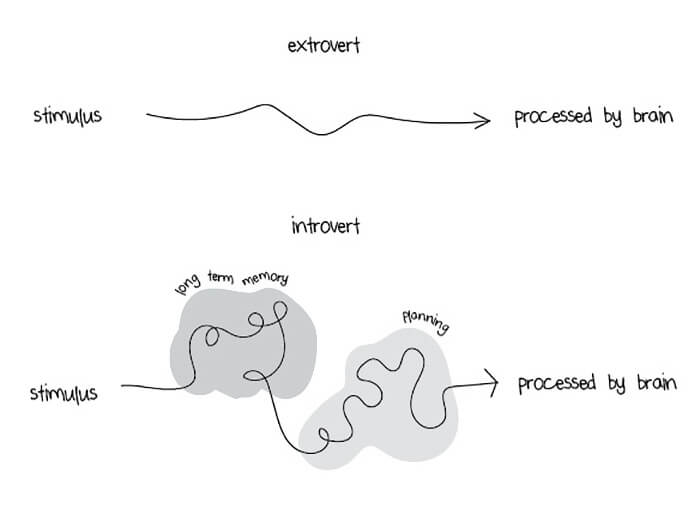Introverts Have the Most Interesting Minds

Introverts often go unnoticed. People hardly ever consider what lies behind that reserved, guarded, silent facade. Introverts are observers, explorers of those senses that connect more intimately with reality, with small details.
Each of us processes information differently, we already know that. However, sometimes we forget that these differences are linked primarily to our personality type. According to Marti Olsen Laney, author of the book “The Introvert Advantage,” introverted people process information in a more leisurely, meticulous, and deeper way.
“Silence is the great component in which great things are formed”
-Thomas Carlyle-
This is true for one very specific and fascinating reason. Every stimulus in the introvert’s brain goes on a complex journey through emotional memory, analysis, and planning. For the most part, extroverts have a slightly lower sensitivity to stimuli and are thus much quicker to respond or act.
It’s not a question of saying one personality is better than another. In fact, most of us are a little of both, though we may be closer to one than the other. What we want to point out are the misunderstandings and neglect (especially in schools) of introverts.
Here’s what we found…

Introverts, strangers in a world full of extroverts
Every day, teachers see students in their classrooms sitting in the back row, spending the whole class in silence, engrossed in some aspect of the class or secretly scribbling in their notebooks. They don’t like answering questions aloud or interacting in the lessons. That’s not how they function.
However, schools and even universities continue to value more highly the students who participate, speak out, raise their hands, and otherwise convey enthusiasm and interest.
The stereotype that extroverts are more successful is deeply ingrained in our society. Social psychology specialists, for example, indicate that in recent decades the profile of the extroverted person, charismatic but at the same time egocentric, and not sensitive to the needs of others, is more and more popular in our workplaces and elsewhere.
It’s as if society calls these behavioral and personality traits effective without really evaluating how productive they are, or whether they know how to work with others. However, and here comes the most surprising part, leading research now reveals that introverted, quiet, reflective, and patient people would create a much more productive and satisfying work environment.

On the other hand, professor and researcher Francesca Gino of Harvard University carried out a study that showed that there are very few introverted leaders in today’s world. They are strangers in a world where the extrovert conquers all.
However, in workplaces where the management team has an unhurried, thoughtful, and sensitive leader, employees feel enabled. Employees are much more proactive, creative, and happier, and find that their introverted leader gives them confidence and new opportunities.
The minds of introverts
Introverts are not necessarily shy. They are unhurried and have a different rhythm. They have different needs. To them, the world goes too fast sometimes and doesn’t give them time to analyze every detail like they’d prefer. Because every nuance of their reality must first pass through their emotion filter, and then with great meticulousness they do what they have to do.
Some find silence uncomfortable and unbearable … Maybe it’s because they have too much noise in their life.
Introverts don’t feel comfortable being the center of attention. They don’t belong to anyone else’s “solar system” and prefer to orbit privately, sometimes even in solitude. Other people think it’s strange, and that’s often why quiet people are labeled as timid, shy, reserved, or disinterested. However, it’s important to know that this style of personality hides its treasures deep down, and that is where its immeasurable beauty lies.
Let’s look at introverts in detail now…

5 characteristics of a silent introvert
First of all, a lot has been written on the subject. Books like “The Introverted Leader: Harness Your Silent Talent” by Jennifer B. Kahnweiler are a great resource to help us understand this personality better.
Here are some fundamental traits of an introverted mind:
- They think before they speak. They are considerate when they communicate, they know how to listen, reflect and then respond.
- Introverts do not like superficiality. Their focus of interest lies in the depths of reality. Thus, they are imaginative, they like to relate ideas, concepts, they are dreamers and they often talk to themselves.
- Quiet people are often characterized by a high self-confidence. They do not let themselves be carried away by other people’s opinions, they have solid values and clear ideas.
- Introverts prefer writing to speaking. They feel more comfortable with the written word.
Finally, as we have pointed out previously, solitude is a common refuge for introverts. However, it should be noted that they are not escaping from reality, but rather using it as a space to recharge and focus when they feel that the world too full of noise and people and movement.
Because when it comes down to it, quiet people are well aware of all the benefits of reflection, imagination, and above all, that wonderful, restful silence.
Introverts often go unnoticed. People hardly ever consider what lies behind that reserved, guarded, silent facade. Introverts are observers, explorers of those senses that connect more intimately with reality, with small details.
Each of us processes information differently, we already know that. However, sometimes we forget that these differences are linked primarily to our personality type. According to Marti Olsen Laney, author of the book “The Introvert Advantage,” introverted people process information in a more leisurely, meticulous, and deeper way.
“Silence is the great component in which great things are formed”
-Thomas Carlyle-
This is true for one very specific and fascinating reason. Every stimulus in the introvert’s brain goes on a complex journey through emotional memory, analysis, and planning. For the most part, extroverts have a slightly lower sensitivity to stimuli and are thus much quicker to respond or act.
It’s not a question of saying one personality is better than another. In fact, most of us are a little of both, though we may be closer to one than the other. What we want to point out are the misunderstandings and neglect (especially in schools) of introverts.
Here’s what we found…

Introverts, strangers in a world full of extroverts
Every day, teachers see students in their classrooms sitting in the back row, spending the whole class in silence, engrossed in some aspect of the class or secretly scribbling in their notebooks. They don’t like answering questions aloud or interacting in the lessons. That’s not how they function.
However, schools and even universities continue to value more highly the students who participate, speak out, raise their hands, and otherwise convey enthusiasm and interest.
The stereotype that extroverts are more successful is deeply ingrained in our society. Social psychology specialists, for example, indicate that in recent decades the profile of the extroverted person, charismatic but at the same time egocentric, and not sensitive to the needs of others, is more and more popular in our workplaces and elsewhere.
It’s as if society calls these behavioral and personality traits effective without really evaluating how productive they are, or whether they know how to work with others. However, and here comes the most surprising part, leading research now reveals that introverted, quiet, reflective, and patient people would create a much more productive and satisfying work environment.

On the other hand, professor and researcher Francesca Gino of Harvard University carried out a study that showed that there are very few introverted leaders in today’s world. They are strangers in a world where the extrovert conquers all.
However, in workplaces where the management team has an unhurried, thoughtful, and sensitive leader, employees feel enabled. Employees are much more proactive, creative, and happier, and find that their introverted leader gives them confidence and new opportunities.
The minds of introverts
Introverts are not necessarily shy. They are unhurried and have a different rhythm. They have different needs. To them, the world goes too fast sometimes and doesn’t give them time to analyze every detail like they’d prefer. Because every nuance of their reality must first pass through their emotion filter, and then with great meticulousness they do what they have to do.
Some find silence uncomfortable and unbearable … Maybe it’s because they have too much noise in their life.
Introverts don’t feel comfortable being the center of attention. They don’t belong to anyone else’s “solar system” and prefer to orbit privately, sometimes even in solitude. Other people think it’s strange, and that’s often why quiet people are labeled as timid, shy, reserved, or disinterested. However, it’s important to know that this style of personality hides its treasures deep down, and that is where its immeasurable beauty lies.
Let’s look at introverts in detail now…

5 characteristics of a silent introvert
First of all, a lot has been written on the subject. Books like “The Introverted Leader: Harness Your Silent Talent” by Jennifer B. Kahnweiler are a great resource to help us understand this personality better.
Here are some fundamental traits of an introverted mind:
- They think before they speak. They are considerate when they communicate, they know how to listen, reflect and then respond.
- Introverts do not like superficiality. Their focus of interest lies in the depths of reality. Thus, they are imaginative, they like to relate ideas, concepts, they are dreamers and they often talk to themselves.
- Quiet people are often characterized by a high self-confidence. They do not let themselves be carried away by other people’s opinions, they have solid values and clear ideas.
- Introverts prefer writing to speaking. They feel more comfortable with the written word.
Finally, as we have pointed out previously, solitude is a common refuge for introverts. However, it should be noted that they are not escaping from reality, but rather using it as a space to recharge and focus when they feel that the world too full of noise and people and movement.
Because when it comes down to it, quiet people are well aware of all the benefits of reflection, imagination, and above all, that wonderful, restful silence.
This text is provided for informational purposes only and does not replace consultation with a professional. If in doubt, consult your specialist.







